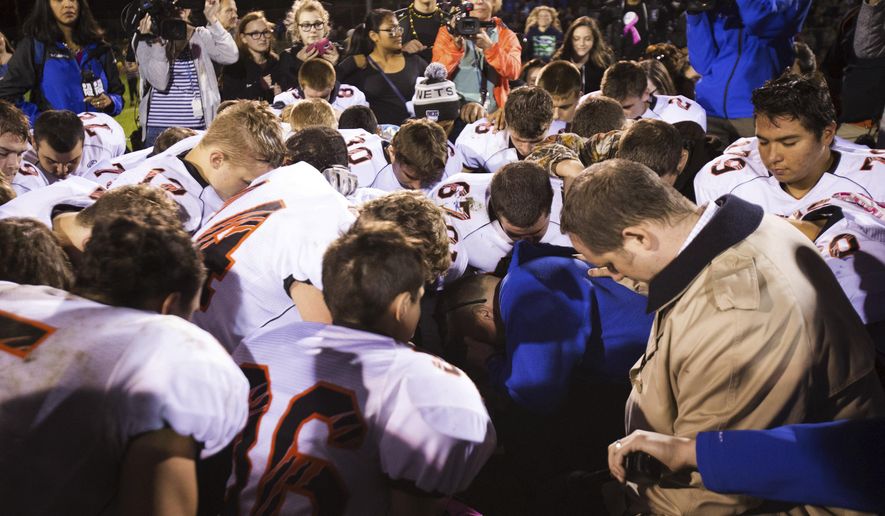A version of this story appeared in the Higher Ground newsletter from The Washington Times. Click here to receive Higher Ground delivered directly to your inbox each Sunday.
A 2022 Supreme Court ruling allowing a Washington state high school football coach to pray on the field at the end of games is the first step in a nationwide push to return affirmations of faith to the public square, according to the Christian legal group that won the case.
The Texas-based First Liberty Institute announced Monday a “Restoring Faith In America” campaign aimed at defending the right to openly pray, display the Ten Commandments, erect nativity scenes and otherwise express faith in arenas where religiosity disappeared in recent decades.
First Liberty President and CEO Kelly Shackelford said the high court’s 6-3 decision in favor of coach Joe Kennedy means public affirmations of faith that were once blocked are now permitted — and Americans should seize these opportunities, he said.
“Every American right now has more religious freedom than they’ve ever had in their lifetime,” Mr. Shackelford said in a YouTube video released Monday. “The problem is most don’t know.”
The group has set up a website for the “Restoring Faith” campaign and is asking Americans “to take a knee” on Sept. 1 when Mr. Kennedy does so when he returns as the coach for Bremerton High School, which fired the coach in 2015 for leading post-game prayers on the 50-yeard-line.
The Supreme Court’s decision in favor of Mr. Kennedy, Mr. Shackelford said, is a sign that a pivotal 1971 decision that is cited to block the involvement of religion in civic and public settings may no longer apply.
The 1971 case, Lemon v. Kurtzman, set up a three-pronged test of government aid to religious entities, and by extension, any involvement of religion in government settings such as schools.
The criteria were whether the aid had a clear secular purpose, would advance or inhibit religion, or create an “excessive” government entanglement with religion.
Mr. Shackelford said the practical outcome of the “Lemon test” — as the criteria came to be known — has been a “strict separation of church and state, that wherever government is, religion can’t be.”
He said, “For the last 50 years, we’ve seen attacks on nativity scenes at Christmas … menorahs at Hanukkah, a Ten Commandments monument and a prayer at a school board meeting.”
The First Liberty executive said that under the Lemon test, “any religion at school, it’s like there’s a fire at the school.”
Now, he said, “Everything you’ve been taught for the last 50 years that you can do, you can do now. The crosses that went down, they come back up. The Ten Commandments that were pushed into the closet, they can come back out. The prayer that was stopped at the school board meeting, [they] can’t stop it anymore.”
Matt Krause, who is of counsel to First Liberty, said in an interview that while pushback is to be expected, “We are confident the law says … you can do that, you can exercise your faith in this way. You can have these public displays of religion.”
He said the “Lemon test” is replaced by a legal standard of “history and tradition,” which he said clearly supports Ten Commandments displays.
“There’s hardly any more document in American culture in American history and American jurisprudence that is foundational or has the history and tradition than the Ten Commandments,” Mr. Krause said.
Such certainty will not likely deter opponents, such as District-based Americans United for Separation of Church and State.
Rachel Laser, the organization’s president and CEO, told The Washington Times via email, “First Liberty Institute doesn’t promote religious freedom — it advocates for religious majoritarianism. In a country where the religious landscape is rapidly shifting, the America First Liberty seeks is not an America that works for us or an America that most people want.”
• Mark A. Kellner can be reached at mkellner@washingtontimes.com.




Please read our comment policy before commenting.